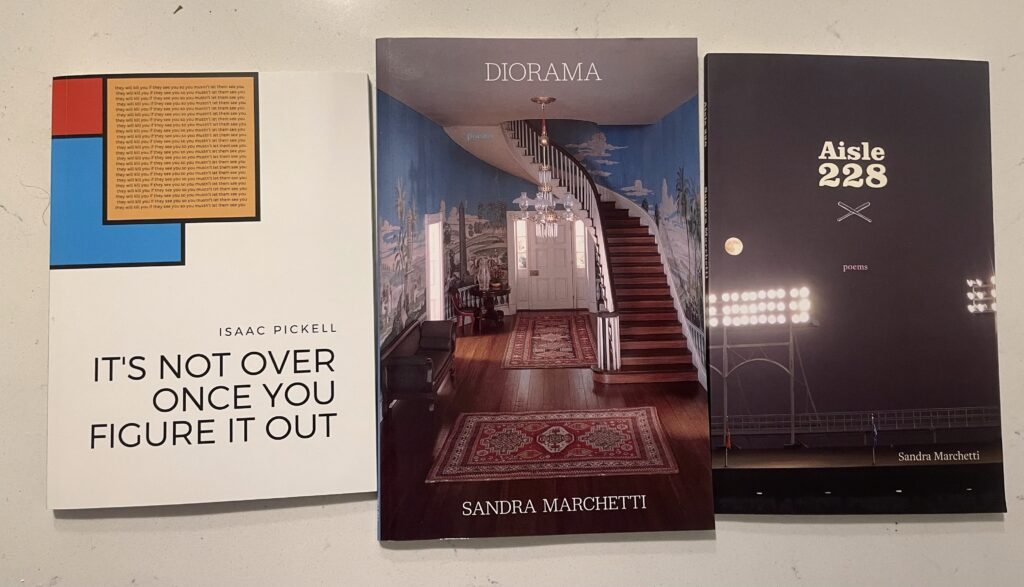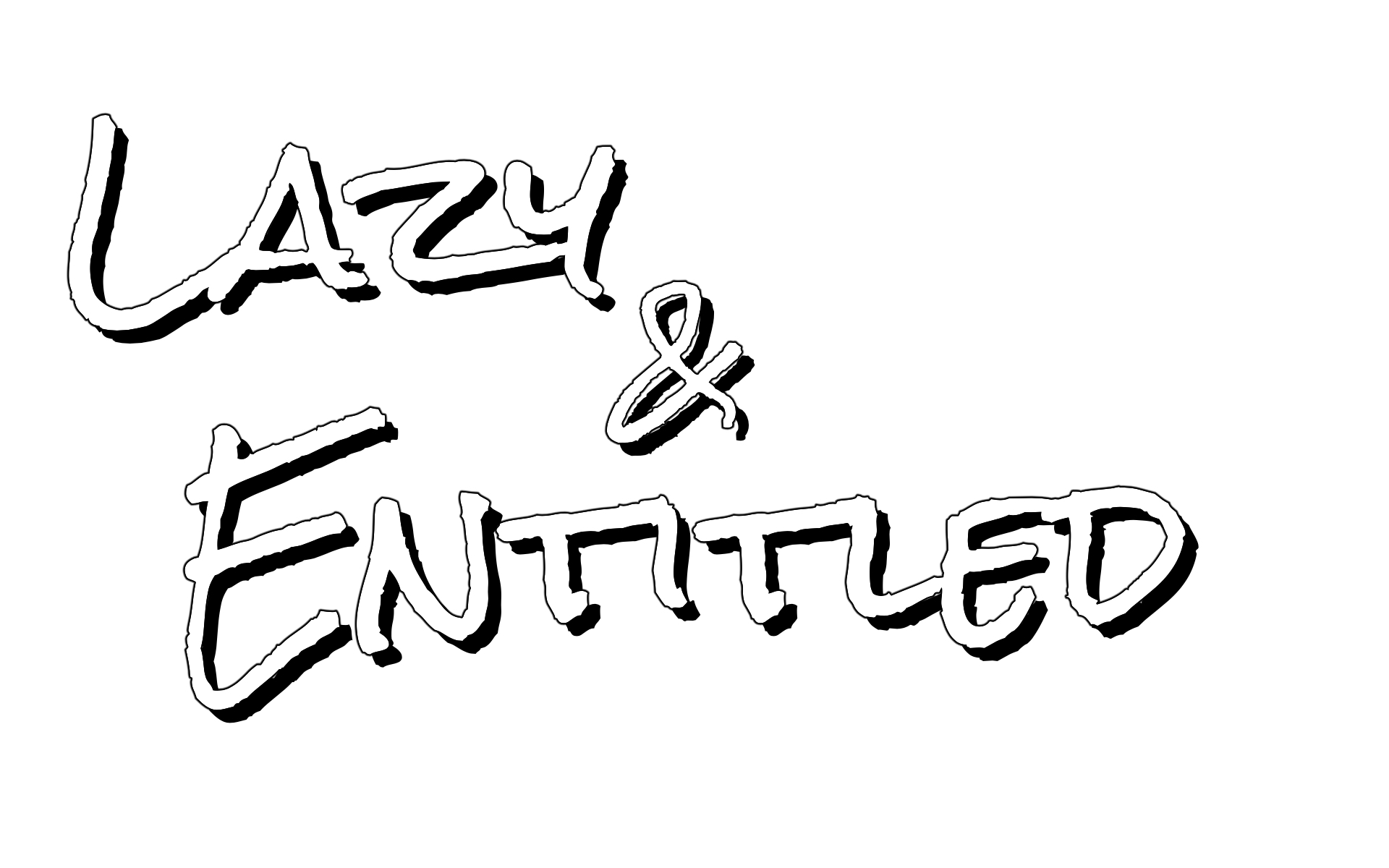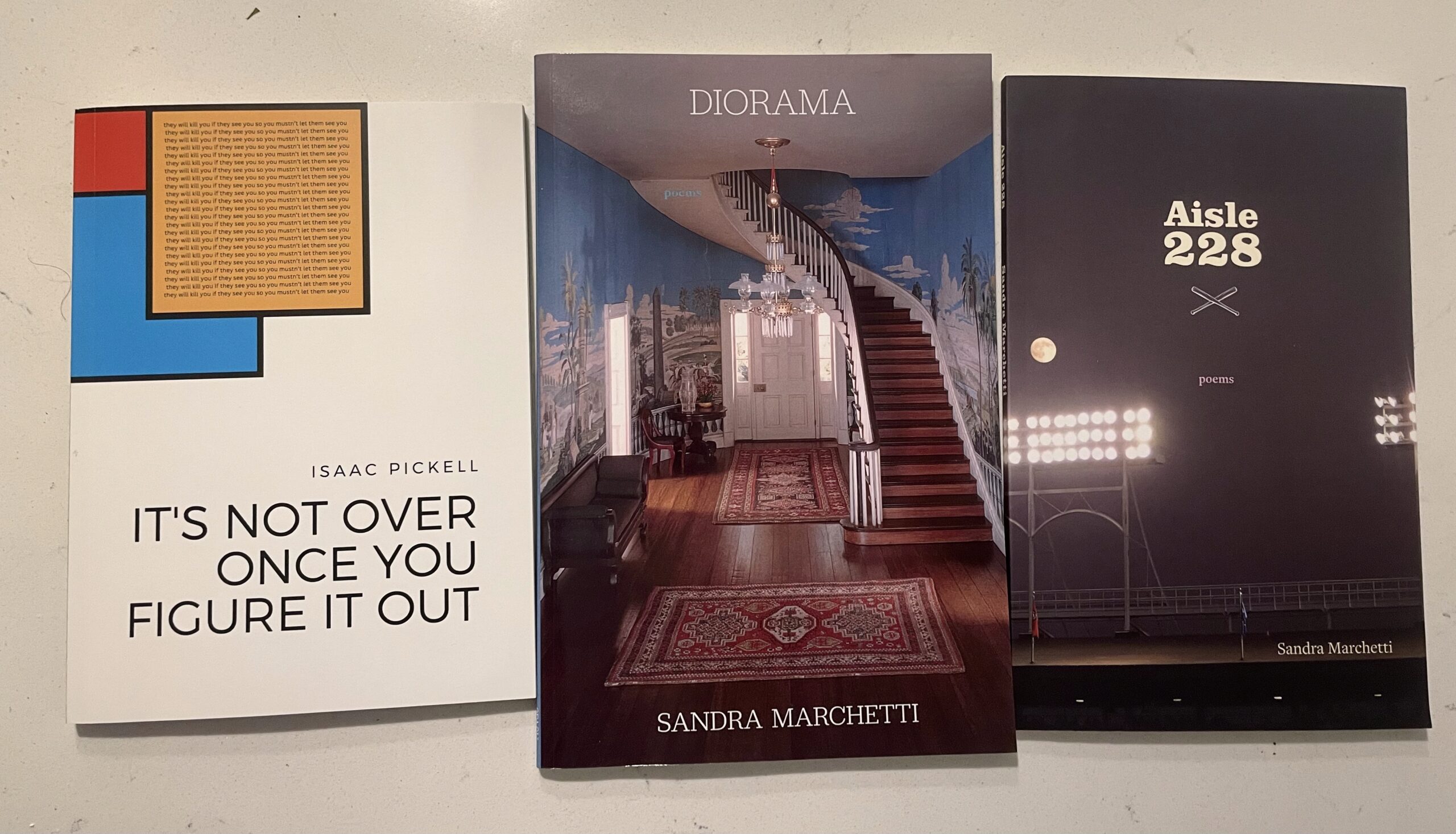“cops & landlords know / where to buy. but the past is // what you make of it & the future, / the future does not need // to echo anything / to be heard:” – Isaac Pickell, “Decay:Relay”
A while ago, one of the big New York publications had an article about new rules of etiquette. Being an adult with a functioning brain and things to do, I don’t let Condé Nast tell me how to have good manners. However, I do listen to The Daily Zeitgeist, and they spent a lot of time clowning the inclusion of “don’t feel bad for not reading your friends’ books.” The TDZ crew was talking about how hilariously out-of-touch it is to assume that most friend groups have multiple published authors, and I agree that is hilariously out-of-touch. Me, though? I’m built different than both the average person and the average upper middlebrow magazine reader. Since I was in high school, I knew I wanted to be friends with authors when I grew up. By that metric, my adult life is a huge success. The thing is: while I believe that art calls to us when it calls to us and there’s no such thing as being “late” to a book, I think you should read your friends’ books, preferably in a timely manner. You’re telling me you’d be friends with Nightcrawler and never accept his offer to teleport you places? You’d be friends with Iceman, but not let him chill your beer with his breath? You’d be friends with Beast, but—you know what, just read your friends’ books.
What I’ve Been Reading This Week:
Three books which, for one reason or another, eluded me. One, I was supposed to pick up at an author signing at AWP, but I missed the window, for some forgotten reason. Another that came out while I was in the throes of a year without employment. Three books by two authors who are not only former The Line Break guests, but have proven to be cool and fun hangs irl, too. I’m talking, of course, about It’s not over once you figure it out by Isaac Pickell and Aisle 228 and Diorama by Sandra Marchetti.

It’s not over once you figure it out by Isaac Pickell: it feels like it won’t be long before Bob and I are saying we knew Isaac when. The Cave Canem fellow is a poet’s poet, crafting these dense bricks that aren’t so heavy you can’t carry them, but you know you’ve got a bag of bricks slung over your shoulder. If you follow Isaac on Bluesky or Substack, as I do, you know that he is a constantly writing poet who is constantly wrestling with “disparate” parts of his own identity. He’s an anti-Zionist Jewish man, he’s a white-passing Black man, and our stupid society doesn’t make being those things easy. How this plays out on the page is long poems with heady concepts that don’t read as concrete immediately—nothing as simple as plums in an icebox, here—but are actually devastatingly, brutally of the present moment. The effect is not unlike reading a good David Roth column, in poem form. At various points in the book, the pages slowly fade from white to black, with blink-and-you’ll-miss-them stanzas in white text. It’s as if something essential is trying to get to the surface, is being held down, but is too strong to permanently contain. That’s almost how each line of poetry functions, too, reaching for tendril after connective tissue in ways that always feel necessary. It’s impressive stuff, read this book.
Aisle 228 by Sandra Marchetti: if it’s sports poetry, I’m almost predestined to like it, unless we’re getting into some hokey, Robert Frost-by-way-of-Rick-Reilly stuff. Sandy’s book about Cubs fandom, family, Wrigley Field, baseball fields in the United States, history, suffering for sports, the 2016 World Series, and more Cubs fandom is sports poetry I love. I’ll get into what I like about Sandy’s style when I talk Diorama. Right now, I want to talk about how underrated sports poetry is. Now that sports fandom is mostly dudes being fake GMs, gambling, and half-cocked gym bro conspiracy theories, sports poetry feels more and more important. Give me the feeling of watching your favorite team, make me feel the agony and ecstasy by using music image metaphor. Besides, as corny as the dude is, Aaron Sorkin was extremely correct to write “how can you not be Romantic about baseball?” You got to. Sandy knows it, that’s the epigraph of this book.
Diorama by Sandra Marchetti: decidedly not a baseball book, here, Sandy’s poetic skills need some praise. She writes these tight, compact poems that feel delicate and yet built for all terrains. These poems remind me a little of Elizabeth Willis, whose book Meteoric Flowers was once described by classmate as “idk, these poems are little flowers with the power of a meteor. What else do you want me to say?” The overarching theme here is influence and ekphrasis, Sandy is consciously writing about other poets and artists she likes in ways that feel like making a diorama. “Here’s my version,” some of these poems seem to say. “Both tribute and original, collapsed into miniature.” These poems rip.
LINKS!
We’re doing a bunch of videos this week! Have fun! Happy Friday! The first one is serious
The occupation of Chicago has a $2 million per day price. The homie H Kapp-Klote asks what Chicagoans could do with $2 million per day.
Did you know the chords to Rainbow Road are just as wild as Rainbow Road? Here’s inperplex.
As I said recently, I love Happy Imaeda’s videos. Please, enjoy a 6/8 groove.
Admittedly, this one is still in the to-be-watched list, and I’m using my own blog as a bookmark. But I love PBS Eons, and I love weird marine life.
Lastly, come on. You knew this was coming. You already knew that Micah and Brendan have a show.
If you work in the service industry, may you clean up in tips this weekend. I’m on a mini-vacation in Baltimore, because my in-laws live here and my brother is doing a play here. Take that as a reminder to call a family member this weekend. Relationships are important, and worth maintaining. Unless the person on the other end of the phone MAGA, of course. If that’s the case, go watch more Micah and Brendan.
Sorry you got an email,
Chris

